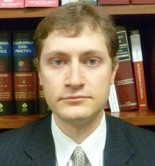Grinberg: A Moment on 4060 Exams
Friday, May 29, 2020 | 0
I am guessing that your inbox is pretty saturated with coronavirus posts, articles, webinars, etc. Since California is looking at an exposure rate of 90,000 cases as of May 23, for a population of around 40 million, the odds of exposure at the moment are relatively low .225%. Maybe it’s OK to do a blog post or two about something other than COVID-19.

Gregory Grinberg
Assuming that it is, let’s talk about everyone’s favorite workers’ compensation subject: panels.
So, a big chunk of litigation and the expedited hearing calendar at the Workers' Compensation Appeals Board is for panel disputes. Well, when a claims handler issues a delay notice, Labor Code 4060 allows the parties to request a panel of qualified medical examiners to determine the various issues in play, such as arising out of employment/course of employment.
However, the road to the panel through 4060 is relatively narrow: It applies only after the claim form is filed and only if a medical-legal evaluation is required to determine compensability.
California Code of Regulations Section 30 fleshes this requirement out further: A request for a panel under LC 4060 must include a claims administrator’s notice that the claim was denied or a request for an examination to determine compensability.
Well, what happens when a claims administrator delays the claim but doesn’t request a QME examination? This isn’t by any stretch of the imagination an unlikely scenario, as there are lots of reasons to deny a claim that have nothing to do with anything that a doctor might comment on. For example, no number of medical professionals is going to dissuade me that the bow tie is superior to the regular necktie.
So what happens when the employer tells the claims handler that the claimant absolutely got injured but wasn’t working on the day claimed? The applicant stopped by work on his day off to pick up a coworker to go out and was standing in front of the shop when he got hit by a distracted driver.
Well, upon getting such a report from the employer, the adjuster might delay the claim but not want to trigger the panel process. Why incur the costs and delays of a QME when AOE/COE is going to turn on a purely factual investigation?
In Plascencia v. Adecco USA Inc., a recent panel decision, a similar situation arose. Defendant sent out a delay letter but did not request a QME examination as part of the delay notice. Defendant then denied the claim.
Applicant obtained a panel in chiropractic medicine using the delay notice. When the defendant tried to get a panel in orthopedic medicine, the Medical Unit rejected the request, as a panel had already been issued.
The matter proceeded to trial and the workers' compensation judge found that the chiropractic panel was invalid and that the Medical Unit should issue an orthopedic panel as per defendant’s request. Applicant sought removal.
Now at this point, I would like to point out the WCAB’s statement: “[t]he issue of the validity of the chiropractic QME panel must be addressed before further discovery and proceedings are conducted. Both parties will be substantially prejudiced by continued trial preparation without addressing the validity of the chiropractic QME panel.”
This is a pretty important point of guidance for all parties. The winner of a trial-level QME dispute will often tell the loser that he should proceed with the case and then seek reconsideration later. That is a poor remedy, and the Plascencia panel clearly lays that out. Removal is absolutely appropriate for a panel dispute.
Moving on to the case, the panel sent it back to the trial level to develop the record further to have the parties address whether defendant’s acceptance of the case closes the 4060 door to get a panel, and to locate the claim form, as one was not included in the board record.
But that leaves us with our own questions to address. If the delay notice does not request a medical-legal examination, can the parties still obtain a panel?
If defendant issues a delay notice but then issues an acceptance before applicant obtains a panel, can the parties still use a delay notice to get a panel?
Can the losing party of a panel dispute refuse to participate with the prevailing party’s panel pending the WCAB ruling on its petition for removal?
One of the wonderful things about workers’ compensation is that there is no shortage of fact patterns to make every case just a little bit unique.
Gregory Grinberg is Managing Partner of Gale, Sutow & Associates S.F. Bay South Office and a Certified Specialist in Workers’ Compensation Law. This post is reprinted with permission from Grinberg’s WCDefenseCA blog.







Comments